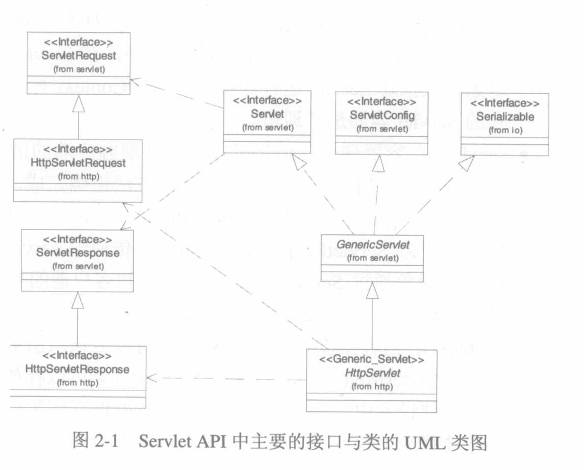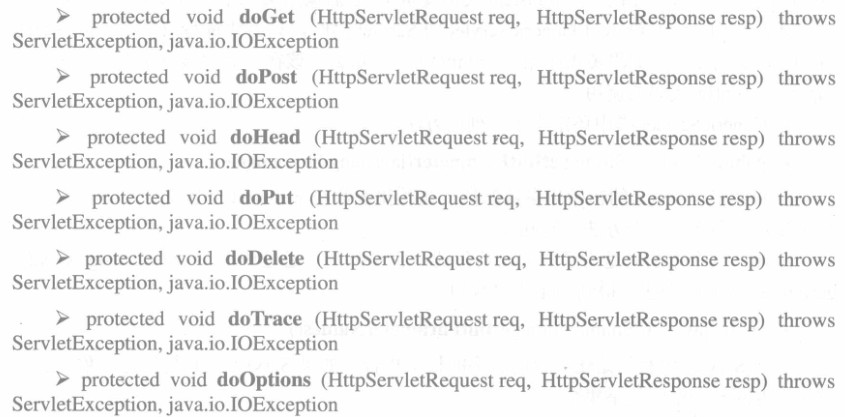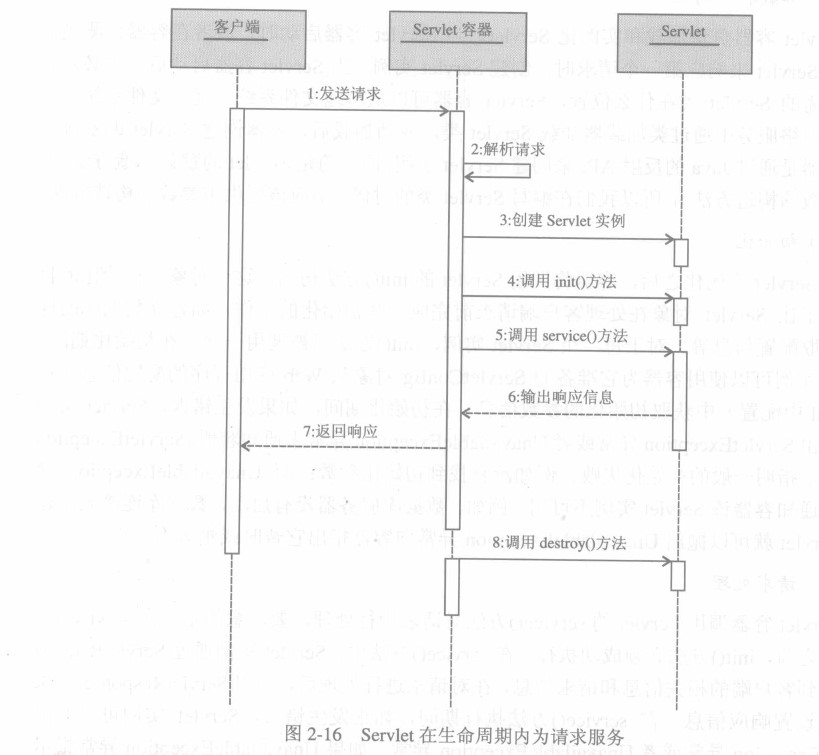servlet家族:
ServletRequest和ServletResponse
Servelt由Servlet容器来管理,当客户请求到来时,容器创建一个ServletRequest对象,封装请求数据,同时创建一个ServletResponse对象,封装相应数据。这两个对象将被容器作为service()方法的参数传递给Servlet,Servlet利用ServletRequest对象获取客户端发来的请求数据,利用ServletResponse对象发送相应数据。
HttpServletRequest和HttpServletResponse
常用方法:
httpServletRequest:
| 方 法 | 说 明 |
| getAttributeNames() | 返回当前请求的所有属性的名字集合 |
| getAttribute(String name) | 返回name指定的属性值 |
| getCookies() | 返回客户端发送的Cookie |
| getsession() | 返回和客户端相关的session,如果没有给客户端分配session,则返回null |
| getsession(boolean create) | 返回和客户端相关的session,如果没有给客户端分配session,则创建一个session并返回 |
| getParameter(String name) | 获取请求中的参数,该参数是由name指定的 |
| getParameterValues(String name) | 返回请求中的参数值,该参数值是由name指定的 |
| getCharacterEncoding() | 返回请求的字符编码方式 |
| getContentLength() | 返回请求体的有效长度 |
| getInputStream() | 获取请求的输入流中的数据 |
| getMethod() | 获取发送请求的方式,如get、post |
| getParameterNames() | 获取请求中所有参数的名字 |
| getProtocol() | 获取请求所使用的协议名称 |
| getReader() | 获取请求体的数据流 |
| getRemoteAddr() | 获取客户端的IP地址 |
| getRemoteHost() | 获取客户端的名字 |
| getServerName() | 返回接受请求的服务器的名字 |
| getServerPath() | 获取请求的文件的路径 |
HttpServletResponse:
| 方 法 | 说 明 |
| addCookie(Cookie cookie) | 将指定的Cookie加入到当前的响应中 |
| addHeader(String name,String value) | 将指定的名字和值加入到响应的头信息中 |
| containsHeader(String name) | 返回一个布尔值,判断响应的头部是否被设置 |
| encodeURL(String url) | 编码指定的URL |
| sendError(int sc) | 使用指定状态码发送一个错误到客户端 |
| sendRedirect(String location) | 发送一个临时的响应到客户端 |
| setDateHeader(String name,long date) | 将给出的名字和日期设置响应的头部 |
| setHeader(String name,String value) | 将给出的名字和值设置响应的头部 |
| setStatus(int sc) | 给当前响应设置状态码 |
| setContentType(String ContentType) | 设置响应的MIME类型 |
GenericServlet
为了简化Servlet的编写,在javax.servlet包中提供了一个抽象的类GenericServlet,它给出了除service方法外的其他4个方法的简单实现。GenericServlet类定义了一个通用的、不依赖于具体协议的Servlet,它实现了Servlet接口和ServletConfig接口。
HttpServlet
为了快速开发应用于HTTP协议的Servlet类,Sun公司在javax.servlet.http包中给我们提供了一个抽象的类HttpServlet,它继承自GenericService类,用于创建适合web站点的HTTPServlet。
针对HTTP1.1中定义的7中请求方法GET、POST、HEAD、PUT、DELETE、TRACE和OPTIONS,HttpServlet分别提供了7个处理方法:
这7个方法的参数类型及异常抛出类型与HttpServlet类中国的第二个重载service()方法是一致的。当容器接收到一个针对HttpServlet对象的请求时,调用该对象的方法顺序如下:
servlet生命周期
说明:
(1)加载和实例化
(2)初始化
(3)请求处理
(4)服务终止
总结
看了很久关于Servlet的书,感觉效率低,该加快速度了。
附录
HttpServlet类源代码:
package javax.servlet.http;
import java.io.IOException;
import java.io.PrintWriter;
import java.io.OutputStreamWriter;
import java.io.UnsupportedEncodingException;
import java.lang.reflect.Method;
import java.text.MessageFormat;
import java.util.Enumeration;
import java.util.ResourceBundle;
import javax.servlet.GenericServlet;
import javax.servlet.ServletException;
import javax.servlet.ServletOutputStream;
import javax.servlet.ServletRequest;
import javax.servlet.ServletResponse;
public abstract class HttpServlet extends GenericServlet
implements java.io.Serializable {
private static final String METHOD_DELETE = "DELETE";
private static final String METHOD_HEAD = "HEAD";
private static final String METHOD_GET = "GET";
private static final String METHOD_OPTIONS = "OPTIONS";
private static final String METHOD_POST = "POST";
private static final String METHOD_PUT = "PUT";
private static final String METHOD_TRACE = "TRACE";
private static final String HEADER_IFMODSINCE = "If-Modified-Since";
private static final String HEADER_LASTMOD = "Last-Modified";
private static final String LSTRING_FILE =
"javax.servlet.http.LocalStrings";
private static ResourceBundle lStrings =
ResourceBundle.getBundle(LSTRING_FILE);
public HttpServlet() { }
protected void doGet(HttpServletRequest req, HttpServletResponse resp)
throws ServletException, IOException
{
String protocol = req.getProtocol();
String msg = lStrings.getString("http.method_get_not_supported");
if (protocol.endsWith("1.1")) {
resp.sendError(HttpServletResponse.SC_METHOD_NOT_ALLOWED, msg);
} else {
resp.sendError(HttpServletResponse.SC_BAD_REQUEST, msg);
}
}
protected void doHead(HttpServletRequest req, HttpServletResponse resp)
throws ServletException, IOException {
NoBodyResponse response = new NoBodyResponse(resp);
doGet(req, response);
response.setContentLength();
}
protected void doPost(HttpServletRequest req, HttpServletResponse resp)
throws ServletException, IOException {
String protocol = req.getProtocol();
String msg = lStrings.getString("http.method_post_not_supported");
if (protocol.endsWith("1.1")) {
resp.sendError(HttpServletResponse.SC_METHOD_NOT_ALLOWED, msg);
} else {
resp.sendError(HttpServletResponse.SC_BAD_REQUEST, msg);
}
}
protected void doPut(HttpServletRequest req, HttpServletResponse resp)
throws ServletException, IOException {
String protocol = req.getProtocol();
String msg = lStrings.getString("http.method_put_not_supported");
if (protocol.endsWith("1.1")) {
resp.sendError(HttpServletResponse.SC_METHOD_NOT_ALLOWED, msg);
} else {
resp.sendError(HttpServletResponse.SC_BAD_REQUEST, msg);
}
}
protected void doDelete(HttpServletRequest req,
HttpServletResponse resp)
throws ServletException, IOException {
String protocol = req.getProtocol();
String msg = lStrings.getString("http.method_delete_not_supported");
if (protocol.endsWith("1.1")) {
resp.sendError(HttpServletResponse.SC_METHOD_NOT_ALLOWED, msg);
} else {
resp.sendError(HttpServletResponse.SC_BAD_REQUEST, msg);
}
}
private static Method[] getAllDeclaredMethods(Class c) {
if (c.equals(javax.servlet.http.HttpServlet.class)) {
return null;
}
Method[] parentMethods = getAllDeclaredMethods(c.getSuperclass());
Method[] thisMethods = c.getDeclaredMethods();
if ((parentMethods != null) && (parentMethods.length > 0)) {
Method[] allMethods =
new Method[parentMethods.length + thisMethods.length];
System.arraycopy(parentMethods, 0, allMethods, 0,
parentMethods.length);
System.arraycopy(thisMethods, 0, allMethods, parentMethods.length,
thisMethods.length);
thisMethods = allMethods;
}
return thisMethods;
}
protected void doOptions(HttpServletRequest req, HttpServletResponse resp)
throws ServletException, IOException {
Method[] methods = getAllDeclaredMethods(this.getClass());
boolean ALLOW_GET = false;
boolean ALLOW_HEAD = false;
boolean ALLOW_POST = false;
boolean ALLOW_PUT = false;
boolean ALLOW_DELETE = false;
boolean ALLOW_TRACE = true;
boolean ALLOW_OPTIONS = true;
for (int i=0; i<methods.length; i++) {
Method m = methods[i];
if (m.getName().equals("doGet")) {
ALLOW_GET = true;
ALLOW_HEAD = true;
}
if (m.getName().equals("doPost"))
ALLOW_POST = true;
if (m.getName().equals("doPut"))
ALLOW_PUT = true;
if (m.getName().equals("doDelete"))
ALLOW_DELETE = true;
}
String allow = null;
if (ALLOW_GET)
if (allow==null) allow=METHOD_GET;
if (ALLOW_HEAD)
if (allow==null) allow=METHOD_HEAD;
else allow += ", " + METHOD_HEAD;
if (ALLOW_POST)
if (allow==null) allow=METHOD_POST;
else allow += ", " + METHOD_POST;
if (ALLOW_PUT)
if (allow==null) allow=METHOD_PUT;
else allow += ", " + METHOD_PUT;
if (ALLOW_DELETE)
if (allow==null) allow=METHOD_DELETE;
else allow += ", " + METHOD_DELETE;
if (ALLOW_TRACE)
if (allow==null) allow=METHOD_TRACE;
else allow += ", " + METHOD_TRACE;
if (ALLOW_OPTIONS)
if (allow==null) allow=METHOD_OPTIONS;
else allow += ", " + METHOD_OPTIONS;
resp.setHeader("Allow", allow);
}
protected void doTrace(HttpServletRequest req, HttpServletResponse resp)
throws ServletException, IOException
{
int responseLength;
String CRLF = "\r\n";
String responseString = "TRACE "+ req.getRequestURI()+
" " + req.getProtocol();
Enumeration reqHeaderEnum = req.getHeaderNames();
while( reqHeaderEnum.hasMoreElements() ) {
String headerName = (String)reqHeaderEnum.nextElement();
responseString += CRLF + headerName + ": " +
req.getHeader(headerName);
}
responseString += CRLF;
responseLength = responseString.length();
resp.setContentType("message/http");
resp.setContentLength(responseLength);
ServletOutputStream out = resp.getOutputStream();
out.print(responseString);
out.close();
return;
}
protected void service(HttpServletRequest req, HttpServletResponse resp)
throws ServletException, IOException {
String method = req.getMethod();
if (method.equals(METHOD_GET)) {
long lastModified = getLastModified(req);
if (lastModified == -1) {
// servlet doesn't support if-modified-since, no reason
// to go through further expensive logic
doGet(req, resp);
} else {
long ifModifiedSince = req.getDateHeader(HEADER_IFMODSINCE);
if (ifModifiedSince < (lastModified / 1000 * 1000)) {
// If the servlet mod time is later, call doGet()
// Round down to the nearest second for a proper compare
// A ifModifiedSince of -1 will always be less
maybeSetLastModified(resp, lastModified);
doGet(req, resp);
} else {
resp.setStatus(HttpServletResponse.SC_NOT_MODIFIED);
}
}
} else if (method.equals(METHOD_HEAD)) {
long lastModified = getLastModified(req);
maybeSetLastModified(resp, lastModified);
doHead(req, resp);
} else if (method.equals(METHOD_POST)) {
doPost(req, resp);
} else if (method.equals(METHOD_PUT)) {
doPut(req, resp);
} else if (method.equals(METHOD_DELETE)) {
doDelete(req, resp);
} else if (method.equals(METHOD_OPTIONS)) {
doOptions(req,resp);
} else if (method.equals(METHOD_TRACE)) {
doTrace(req,resp);
} else {
//
// Note that this means NO servlet supports whatever
// method was requested, anywhere on this server.
//
String errMsg = lStrings.getString("http.method_not_implemented");
Object[] errArgs = new Object[1];
errArgs[0] = method;
errMsg = MessageFormat.format(errMsg, errArgs);
resp.sendError(HttpServletResponse.SC_NOT_IMPLEMENTED, errMsg);
}
}
private void maybeSetLastModified(HttpServletResponse resp,
long lastModified) {
if (resp.containsHeader(HEADER_LASTMOD))
return;
if (lastModified >= 0)
resp.setDateHeader(HEADER_LASTMOD, lastModified);
}
public void service(ServletRequest req, ServletResponse res)
throws ServletException, IOException {
HttpServletRequest request;
HttpServletResponse response;
try {
request = (HttpServletRequest) req;
response = (HttpServletResponse) res;
} catch (ClassCastException e) {
throw new ServletException("non-HTTP request or response");
}
service(request, response);
}
}
class NoBodyResponse extends HttpServletResponseWrapper {
private NoBodyOutputStream noBody;
private PrintWriter writer;
private boolean didSetContentLength;
// file private
NoBodyResponse(HttpServletResponse r) {
super(r);
noBody = new NoBodyOutputStream();
}
// file private
void setContentLength() {
if (!didSetContentLength)
super.setContentLength(noBody.getContentLength());
}
// SERVLET RESPONSE interface methods
public void setContentLength(int len) {
super.setContentLength(len);
didSetContentLength = true;
}
public ServletOutputStream getOutputStream() throws IOException {
return noBody;
}
public PrintWriter getWriter() throws UnsupportedEncodingException {
if (writer == null) {
OutputStreamWriter w;
w = new OutputStreamWriter(noBody, getCharacterEncoding());
writer = new PrintWriter(w);
}
return writer;
}
}
class NoBodyOutputStream extends ServletOutputStream {
private static final String LSTRING_FILE =
"javax.servlet.http.LocalStrings";
private static ResourceBundle lStrings =
ResourceBundle.getBundle(LSTRING_FILE);
private int contentLength = 0;
// file private
NoBodyOutputStream() {}
// file private
int getContentLength() {
return contentLength;
}
public void write(int b) {
contentLength++;
}
public void write(byte buf[], int offset, int len)
throws IOException
{
if (len >= 0) {
contentLength += len;
} else {
// XXX
// isn't this really an IllegalArgumentException?
String msg = lStrings.getString("err.io.negativelength");
throw new IOException(msg);
}
}
}

























 616
616

 被折叠的 条评论
为什么被折叠?
被折叠的 条评论
为什么被折叠?








